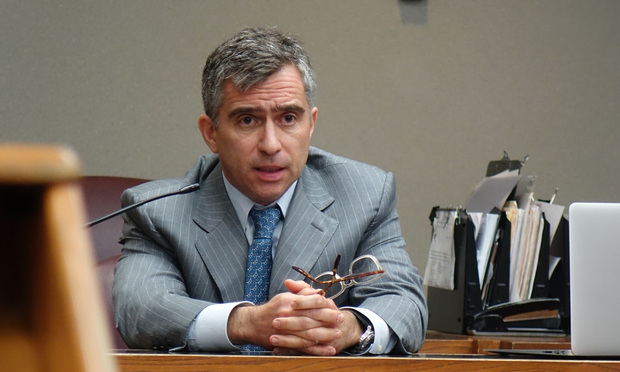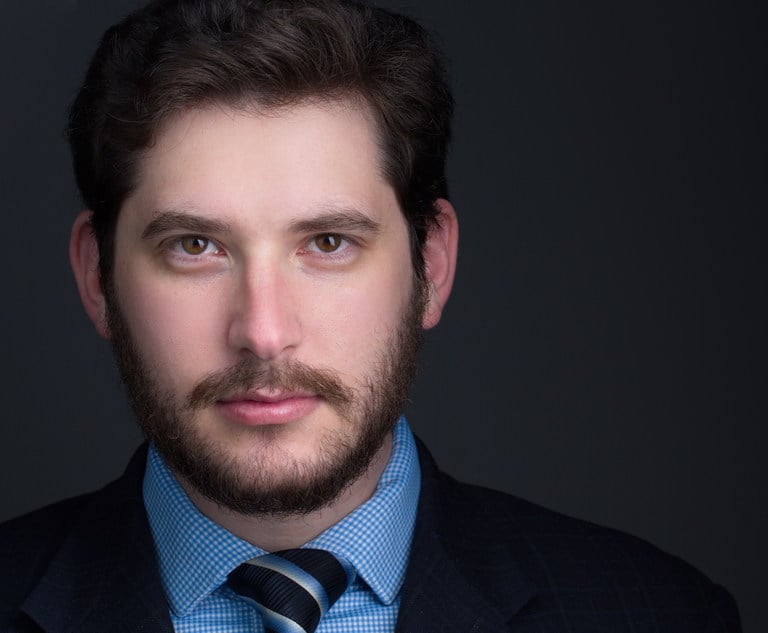Attorneys Fear Ruling Exposes Florida to Baseless International Decrees
Attorneys argue a Third District Court of Appeal decision forces state courts to accept foreign governments' decrees of liability without due process.
February 27, 2018 at 03:34 PM
3 minute read
 Michael R. Tein of Lewis Tein
Michael R. Tein of Lewis Tein
Miami attorneys including former Florida Supreme Court Justice Raoul Cantero are challenging an appellate ruling they argue would require Florida courts to take marching orders from totalitarian regimes.
The attorneys represent two brothers sued in Miami by the Ecuadorean government for allegedly embezzling about $662 million from Filanbanco, the bank where they were administrators. The defendants, Roberto and William Isaias Dassum, initially won dismissal of the lawsuit on standing and statute of limitations grounds.
But in December, the Third District Court of Appeal reversed the decision on both issues. The court ruled the statute of limitations began running in 2008, when Ecuador's version of the Federal Deposit Insurance Corporation found the Isaias brothers liable for the bank's losses and ordered the seizure of their assets.
“In other words, the Isaiases' liability for the losses to Filanbanco has been established in the Republic's act of state …. and pursuant to the act of state doctrine, no court in this country may find otherwise,” wrote Judge Barbara Lagoa, with Judges Richard Suarez and Robert Luck concurring.
The judges instructed the lower court to focus only on damages for the remaining proceedings. They made it clear the trial judge has the option of awarding no damages: “This [decision] does not mean that the republic is entitled to automatically seize the Isaiases' property in Miami-Dade County.”
Now Cantero of White & Case and Michael Tein of Lewis Tein are moving for rehearing en banc, arguing the judges' instructions would have broad constitutional implications.
“Until now, no court in the United States — state or federal — has allowed a foreign sovereign to enforce a government decree determining an individual's liability without either having provided due process in the country of origin or proving its case with evidence here,” the attorneys argue. “Such a holding would be anathema to the constitutional protections of both Florida and the United States prohibiting deprivations of property without due process.”
Ecuador's attorney, Alvin Davis of Squire Patton Boggs in Miami, said the matter was already decided the first time the case went up on appeal.
“They raised all of these same arguments when they moved for rehearing when they lost the first case, and the court ruled against them on all of the points they're raising,” said Davis, who worked with colleague Digna French.
The due process argument “goes nowhere” because the act of state doctrine cuts off any analysis of due process in Ecuador, Davis added. The Third DCA already ruled in the first appeal that the extraterritoriality exception to the doctrine does not apply.
The case was initially heard by Miami-Dade Circuit Judge John Thornton, who acknowledged in his 2015 dismissal order that “there was substantial evidence presented at trial by the Isaiases that they committed no wrongdoing, did not cause any losses to Filanbanco and were not provided due process in Ecuador.” But he ruled the evidence would be more appropriate to consider at a later stage.
In response to a request for comment, Tein pointed to his opening statement during the bench trial, when he told Thornton accepting Ecuador's arguments would be like “enforcing Cuba's 1959 Agrarian Reform Laws or Nazi Germany's Nuremberg Laws to collect assets from Florida residents.”
White & Case attorneys Maria Beguiristain and Jesse Green also represent the Isaiases.
This content has been archived. It is available through our partners, LexisNexis® and Bloomberg Law.
To view this content, please continue to their sites.
Not a Lexis Subscriber?
Subscribe Now
Not a Bloomberg Law Subscriber?
Subscribe Now
NOT FOR REPRINT
© 2025 ALM Global, LLC, All Rights Reserved. Request academic re-use from www.copyright.com. All other uses, submit a request to [email protected]. For more information visit Asset & Logo Licensing.
You Might Like
View All
Tragedy on I-95: Florida Lawsuit Against Horizon Freight System Could Set New Precedent in Crash Cases
2 minute read
'You Lied to the Jury': Veteran Awarded $5 Million in Defamation Case Against CNN
4 minute read
Vedder Price Shareholder Javier Lopez Appointed to Miami Planning, Zoning & Appeals Board
2 minute readTrending Stories
Who Got The Work
J. Brugh Lower of Gibbons has entered an appearance for industrial equipment supplier Devco Corporation in a pending trademark infringement lawsuit. The suit, accusing the defendant of selling knock-off Graco products, was filed Dec. 18 in New Jersey District Court by Rivkin Radler on behalf of Graco Inc. and Graco Minnesota. The case, assigned to U.S. District Judge Zahid N. Quraishi, is 3:24-cv-11294, Graco Inc. et al v. Devco Corporation.
Who Got The Work
Rebecca Maller-Stein and Kent A. Yalowitz of Arnold & Porter Kaye Scholer have entered their appearances for Hanaco Venture Capital and its executives, Lior Prosor and David Frankel, in a pending securities lawsuit. The action, filed on Dec. 24 in New York Southern District Court by Zell, Aron & Co. on behalf of Goldeneye Advisors, accuses the defendants of negligently and fraudulently managing the plaintiff's $1 million investment. The case, assigned to U.S. District Judge Vernon S. Broderick, is 1:24-cv-09918, Goldeneye Advisors, LLC v. Hanaco Venture Capital, Ltd. et al.
Who Got The Work
Attorneys from A&O Shearman has stepped in as defense counsel for Toronto-Dominion Bank and other defendants in a pending securities class action. The suit, filed Dec. 11 in New York Southern District Court by Bleichmar Fonti & Auld, accuses the defendants of concealing the bank's 'pervasive' deficiencies in regards to its compliance with the Bank Secrecy Act and the quality of its anti-money laundering controls. The case, assigned to U.S. District Judge Arun Subramanian, is 1:24-cv-09445, Gonzalez v. The Toronto-Dominion Bank et al.
Who Got The Work
Crown Castle International, a Pennsylvania company providing shared communications infrastructure, has turned to Luke D. Wolf of Gordon Rees Scully Mansukhani to fend off a pending breach-of-contract lawsuit. The court action, filed Nov. 25 in Michigan Eastern District Court by Hooper Hathaway PC on behalf of The Town Residences LLC, accuses Crown Castle of failing to transfer approximately $30,000 in utility payments from T-Mobile in breach of a roof-top lease and assignment agreement. The case, assigned to U.S. District Judge Susan K. Declercq, is 2:24-cv-13131, The Town Residences LLC v. T-Mobile US, Inc. et al.
Who Got The Work
Wilfred P. Coronato and Daniel M. Schwartz of McCarter & English have stepped in as defense counsel to Electrolux Home Products Inc. in a pending product liability lawsuit. The court action, filed Nov. 26 in New York Eastern District Court by Poulos Lopiccolo PC and Nagel Rice LLP on behalf of David Stern, alleges that the defendant's refrigerators’ drawers and shelving repeatedly break and fall apart within months after purchase. The case, assigned to U.S. District Judge Joan M. Azrack, is 2:24-cv-08204, Stern v. Electrolux Home Products, Inc.
Featured Firms
Law Offices of Gary Martin Hays & Associates, P.C.
(470) 294-1674
Law Offices of Mark E. Salomone
(857) 444-6468
Smith & Hassler
(713) 739-1250







